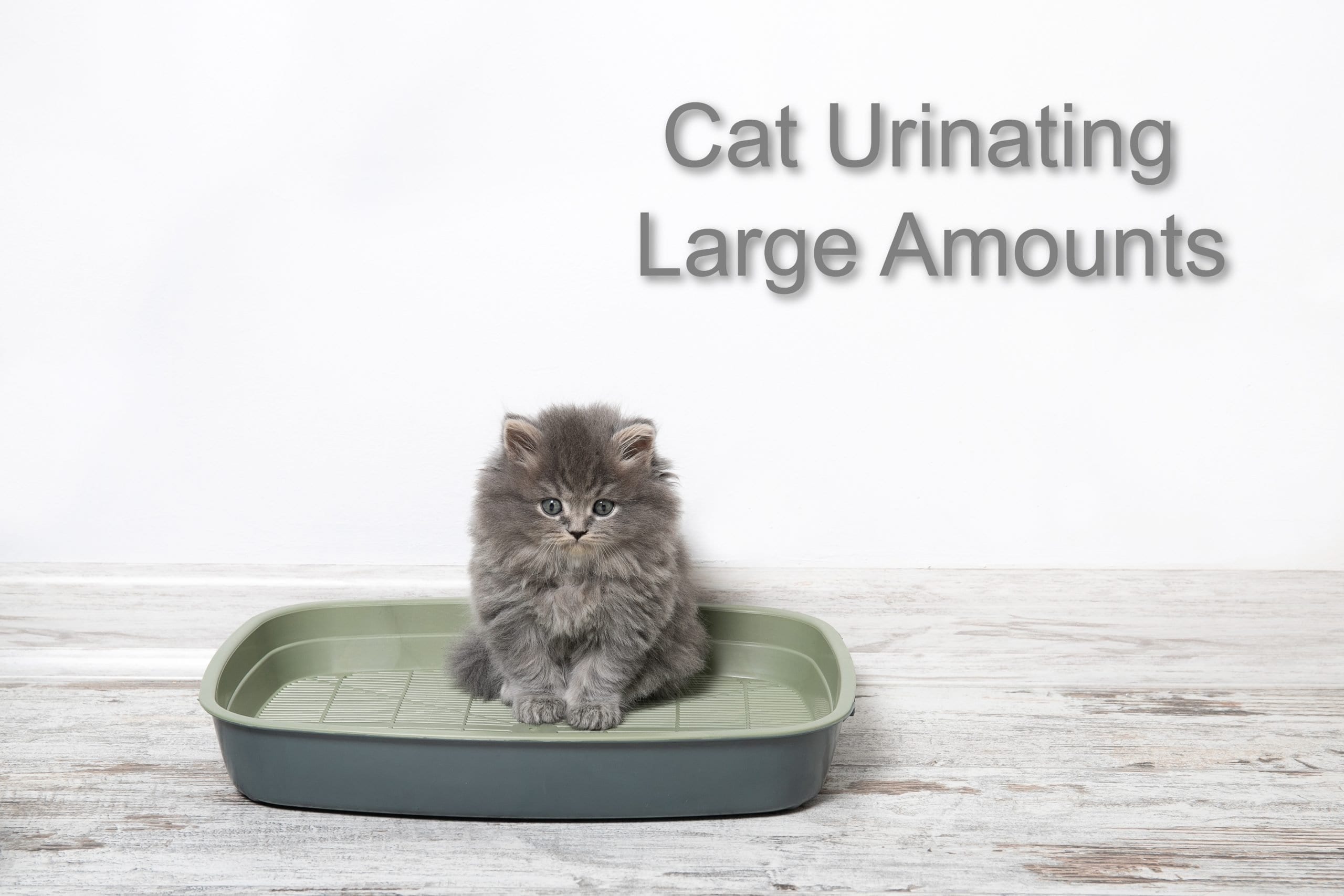Whenever we get a cat, the first thing we usually do is train it to use the litter box, more often than not, it can be a tricky procedure. It usually takes from three to four weeks for a cat/kitten to get used to it, and most time, cats tend to urinate in different spots at first to mark their territory; we also encounter what is commonly known as “little accidents” at times. However, you might notice your cat urinating large amounts -to an abnormal extent-, or that your cat urinates too many times.
So how do we know if the cat is healthy and is just answering nature’s call, or if it is using the litter box a bit too much? Let me walk you through a small guide to address worries that all cat lovers have, and answer those questions.
NOTE: We want to inform our blog readers that before we publish any article, the team “Proudcatowners” does deep research based on experience and knowledge about cats and everything related to them, to guarantees reliable and precise information, satisfy the readers is our first priority.
What is the average number of times a cat urinates?
It is essential to observe and know your cat’s pattern and observe their use of the litter box. Cats usually use the litter box from two to three times a day on average. For some cats, it is perfectly reasonable to urinate even four or five times a day, while for others, this could signal a problem. However, more than five times a day can usually be a bad sign, and veterinary checkup is required.
Why is my cat urinating large amounts?
You noticed that your cat’s litter box is very wet all the time, or that his “little accidents” come in more considerable amounts now. Well, cats’ urination in large volumes can be due to many reasons, and the most common ones are the following:
Hormonal Imbalance
Hyperthyroidism is very common among cats; it mostly affects cats, which are eight and above years old. This condition is considered very dangerous, and if left untreated or undiagnosed for a while, it can cause significant damage to the entire body of that cat.
An overactive thyroid, which is located in the neck area of a cat, is what causes Hyperthyroidism. It could affect other organs, especially in the long run. The thyroid glands have a massive effect on every system’s metabolic rate, so when hormones are produced in large and abnormal quantities, Hyperthyroidism occurs.
Cause of Hyperthyroidism:
Usually, Hyperthyroidism is caused by a non-cancerous mass that exists in the tissue of the thyroid glands; however, in 2 to 3 % of affected cats, cancerous tumors come to existence. 80 % of diagnosed cats usually have both of their glands affected.
Symptoms:
- Growth in appetite (especially with younger cats)
- Weight loss
- Vomiting
- Increased consumption of water
- Urinating in large volumes
Diabetes
Middle-aged to mature cats, especially obese ones, can develop a case of type II Diabetes, which the deficiency in produced insulin, therefore, the inability to balance blood sugar levels in their bodies. Concerning this topic, Thomas Graves of the University of Illinois College of Veterinary Medicine said, “The true incidence isn’t known, but it is estimated at 0.5% to 2% of the feline population. But it is also probably under-diagnosed “. Cats tend to turn to excessive consumption of water to chase out the extra sugar amounts in their blood, which will cause them to wet themselves much more often.
Symptoms of Diabetes
- Weight loss
- Refusing to eat
- Repeated vomiting
- Dehydration
- Elevated levels of thirst
- Increased consumption of water
Bladder Stones
Bladder stones are solid materials that are found in the bladder of a cat, and cats are at risk of forming these stones at any age. It can be formed due to many reasons, some of which are an unbalanced diet, insufficient water consumption, some medications or dietary supplements, and UTI (Urinary Tract Infection).
Symptoms of bladder stones
- Traces blood in the cat’s urine
- Eliminating urine frequently
- Urinary Tract Infection (Chronic)
- Suffering from pain when urinating
- Licking the genital more than usual
- Eliminating urine outside the litter box
Sometimes, cats who formed bladder stones do not show any apparent symptoms and, it is rather hard to find out they have them unless you take it to the veterinarian. These stones can be discovered through ultrasounds for example; however, if they are big enough, the vet could sense them by hand.
Kidney diseases
According to Pet Health Network, Dr. Celeste Clements reported the following: “studies have shown that 1 in 3 cats are affected by Kidney disease”. It is sometimes also known as kidney failure, in which your cat’s kidneys stop performing as they used to do. Which would require you to set a certain diet for your cat that requires food for cats with kidney disease
The dangerous thing about this disease is that cats do not show symptoms in the early stages of this, they only start showing so after their condition is already advanced. Unfortunately, once symptoms start showing, there has already been acute damage to the kidney.
Symptoms of Kidney disease
- Weight loss
- Large amounts of urine/ Eliminating urine more often
NOTE: This disease causes the inability of a cat to retain its body fluids, thus, eliminating them through mostly urine very often and in large amounts.
Causes of Kidney disease
- Infection of Kidney tissue
- Kidney stones
- Kidney blockage
- Toxins
- Feline Infection Peritonitis (FIP)
- Cancer
- Hereditary
How can I spot these symptoms in a cat?
Well, if your cat has a constantly wet litter box, and you can notice it “takes a wee” more often than usual, or it has frequent “little accidents,” it is possible it has a problem, and you should schedule a veterinarian appointment. You may also notice a weight loss concerning your cat, despite their unchanging eating habits, as well as a change in their behaviors, due to their hormonal imbalance, and sometimes even vomiting.
Should I be worried?
If you notice these symptoms in your cat, i.e., if the cat’s litter box is soaked, the urine has some blood traces in it, your cat’s behavior is changing, it lost some noticeable amount of weight, of it is vomiting, you should definitely be concerned and start considering taking your cat to a veterinarian.
Urinating too much (Polyuria) Vs. Urinating frequently (Pollakiuria)
Either urinating too much or frequently urinating in smaller amounts, both of the mentioned indicate a health problem, but be careful not to confuse the two. They have different symptoms, which denote different diagnoses.
Pollakiuria
If your cat is frequently urinating, but in small volumes, it is called Pollakiuria, and most of the time, it means it is not eliminating urine enough. We also refer to the condition that leads to causing the cat pain and discomfort whenever it tries to eliminate urine Dysuria.
This can be a sign of an infection in your cat’s urinary tract, making the process painful, frequent but urine is eliminated in small volumes. More often than not, urine in these cases is accompanied by some blood. Another reason for this disease could be Bladder stones, causing a blockage and preventing the cat from illuminating its urine. Another possible reason is cancer as well. These symptoms eventually lead to kidney failure; therefore, an urgent veterinarian check is required.
Symptoms of Pollakiuria
- Your cat feels very irritated when urinating.
- You can notice your cat is extremely uncomfortable and sometimes in pain when eliminating urine.
- It tends to have many more “little accidents” outside its litter box.
Diagnosis
If you spot any of the symptoms mentioned above, rush your cat to the vet immediately. When taken to the veterinarian, your cat will undergo a full blood profile, including a chemical one. The vet will also conduct a throughout test concerning the properties of your cat’s urine, called Urinalysis. These blood and urine tests will determine the exact diagnosis of your cat, and the kind of disease it has.
Treatment
If the cat’s condition is not critical, it would go through some supportive therapy and take the medications required. However, if their state is dangerous or risky, most cats require hospitalization in this case, and others might need surgery, especially in cases of a tumor.
Polyuria
If your cat is eliminating urine in substantial amounts, more than usual, drinking too much water, and being constantly more thirsty than usual, it can be diagnosed with what we call Polyuria. It is mostly caused by extreme thirst, which indicates other health problems such as diabetes. The cat’s elevated level of thirst is called Polydipsia.
Symptoms
- Change in your cat’s drinking habits.
- Constantly wet litter box
- Abnormally large amounts of eliminated urine.
Diagnosis
Whenever you notice one of the symptoms mentioned above, no matter how small or simple it might seem, you must take your cat to a veterinarian immediately for urgent diagnosis. The sooner you discover the diseases, the better, and the faster it can be cured. When diagnosing Polyuria, your veterinarian would usually compare the usual levels of fluids consumed by a cat, and your cat’s fluids/water consumption; as well as the amounts of urine is eliminated. This would indicate the exact problem that your cat is suffering from, and if it has a more severe disease.
Treatment
After running certain tests and deciding what to eliminate and what the exact diagnosis is, if it is not kidney disease or diabetes or another serious matter, your vet would probably recommend you limit your cat’s access to water a little bit, but being careful that your cat is still constantly hydrated.
However, if your cat is diagnosed with more severe disease, such as kidney disease, the treatment could vary from a special diet supported by medications to surgery. In cases of diabetes, your cat must follow a new diet and a change in eating habits, take regular injections of prescribed insulin, and take medications designated by the vet.
Reasons that can make your cat sick
These reasons can differ from an unhealthy diet to an interaction with another ill cat, but here is a list of the possible reasons:
- Cleaning materials (bleach, detergent)
- Human medications (A cat could take those by mistake if found)
- Rapid dehydration (due to overheating, diarrhea)
- Previous injuries such as a broken pelvis or burst bladder
- Toxic plants
What should I do to prevent my cat’s exposure to toxic materials?
Well, the first thing you should take into consideration when getting a cat is putting all of the toxic materials in an unreachable place, and do not forget that cats are good at reaching shelves, so it is better to keep your cleaning materials and medications in a closed cabin.
What should I do if my cat has been exposed to one of these elements?
If your cat has already consumed medications for humans, swallowed some sort of cleaning material, or has been exposed to another toxic element, you should call a veterinarian immediately. He/She will know what to do. There are times when your vet would guide you or prescribe you certain antidotes, other times where you must rush your cat to the hospital for proper medical care.
How do I know if my cat is dehydrated?
According to PetMD, the classical way to check if your cat is dehydrated is through a skin check. “If you take a pinch of skin over the cat’s shoulders and pull up gently, the skin should snap back into place when released. As the cat gets more dehydrated, the skin goes back in place more and more slowly.”
What can cause dehydration for my cat?
Your cat can get dehydrated if it is exposed to extreme heat for an extended period, so if you forget to let it in on a hot summer day, there are very high chances it will end up dehydrated. It can also occur when your cat is not consuming enough water or if it lost body fluids due to vomiting, diarrhea…etc.
Common ways to spot if your cat is sick (Symptoms)
Eliminating outside the litter box
If your cat is used to using its litter box and then suddenly starts eliminating outside it very often, this can be a sign of a urinary tract infection, kidney disease, or bladder stones.
Licking themselves too often
Usually, cats tend to lick themselves often as a way of cleaning up in general. However, licking their genitals too often can be a sign of a medical problem.
Traces of blood in their urine or their litter box
Blood in a cat’s urine is a sign of a medical problem; some diseases are more severe than others. It can be an indication of a urinary tract disorder or infection, or sometimes a parasitic infection (such as internal worms), which can lead to other complications.
Unexplained weight loss
If you notice that your cat is losing weight despite the same eating diet, you should take it to the vet immediately. Unexplained weight loss, especially sudden one, is very dangerous and urgent. It can be a sign of many illnesses, including cancer.
Change in behavior
If your cat is used to greeting you at the door every day when you come home, and then it suddenly starts hiding, isolating itself, and being less active, that could indicate a health problem. In addition, sick cats tend to be more aggressive at times, and if they are in pain or have a sore spot, their reaction could become violent.
Obesity
If a cat keeps on gaining weight, this will lead to health problems. Because same as humans, cats can develop the same diseases if they are overweight, such as diabetes and heart problems.
Excessive consumption of water
Any change in your cat’s eating and drinking habits is a red flag, and you should schedule an appointment with the veterinarian as soon as possible. Extreme thirst and excessive consumption of water can be a sign of hyperthyroid, diabetes, or kidney disease.
Vomiting
It is common for cats to vomit hairballs every now and then. However, if a cat is vomiting several times a day, that is a medical problem. If you find traces of blood in your cat’s vomit, or if your cat vomits blood, get them to the vet urgently.
Conclusion
In conclusion, cats are lovely creatures, but can also be very vulnerable. If you notice any of the symptoms mentioned above, you must take action. So if your cat is urinating in more significant amounts than usual, if it is in pain, if its urine has blood in it, or if it is vomiting, you should not leave this unmaintained. You should set an appointment with the veterinarian as soon as possible.
In some cases, it can turn out to be a simple problem, or even due to change in diet or food type, in other cases, it can be a serious health problem, and your early visit to the veterinarian would help diagnose it as soon as possible, and start the treatment before it gets any worse.
Most times, we cannot spot the symptoms because they are not clear, and by the time they start showing, the cat’s health has already declined, which is why you should pay attention to the small details, such as urine, the amount of it and its color, a slight change in a cat’s behavior or weight loss.






